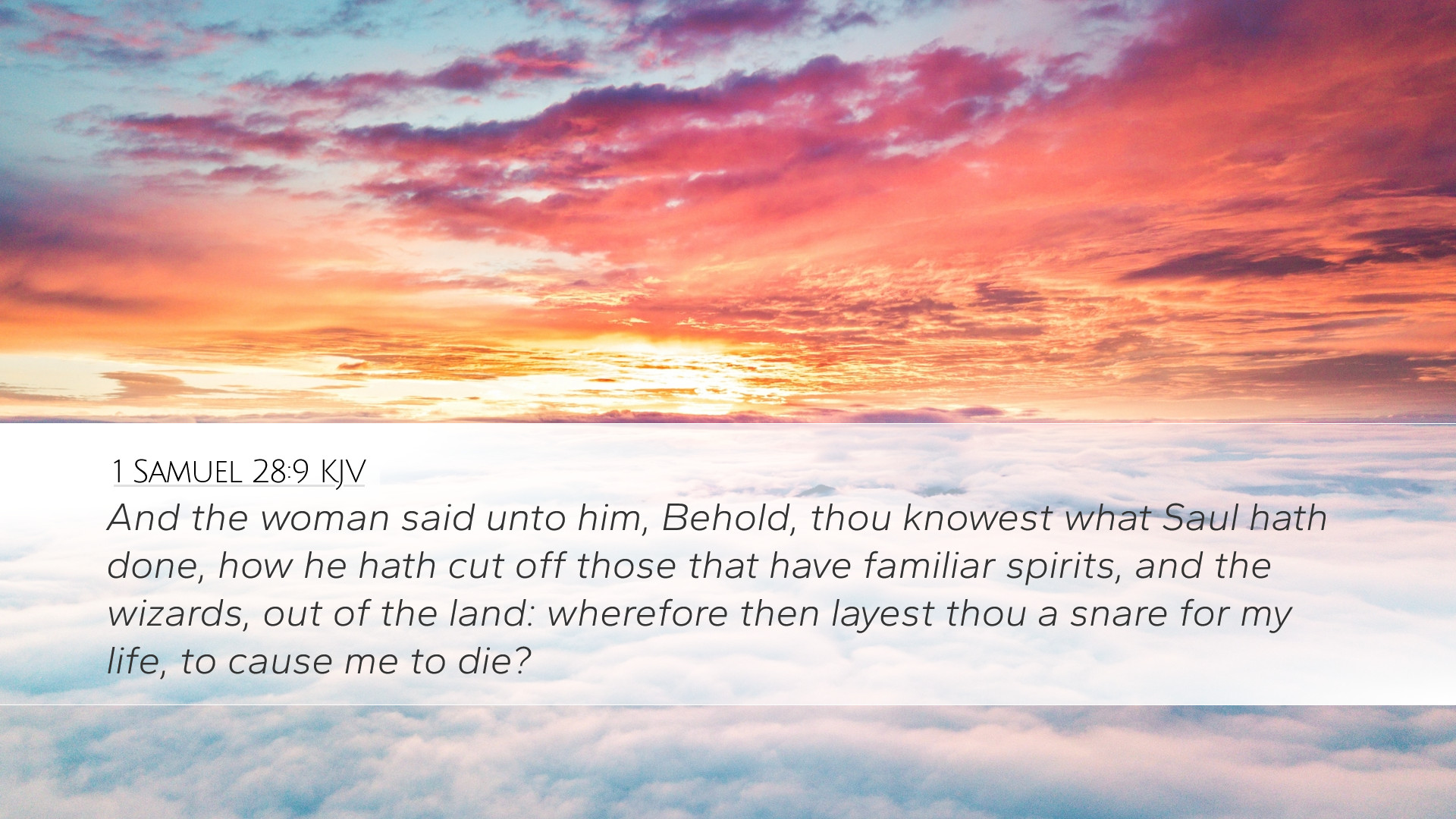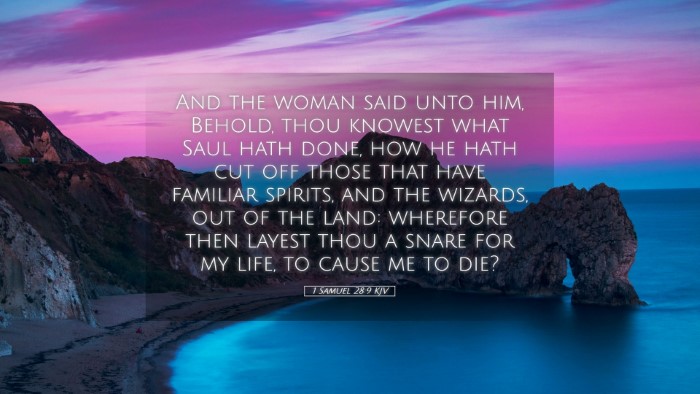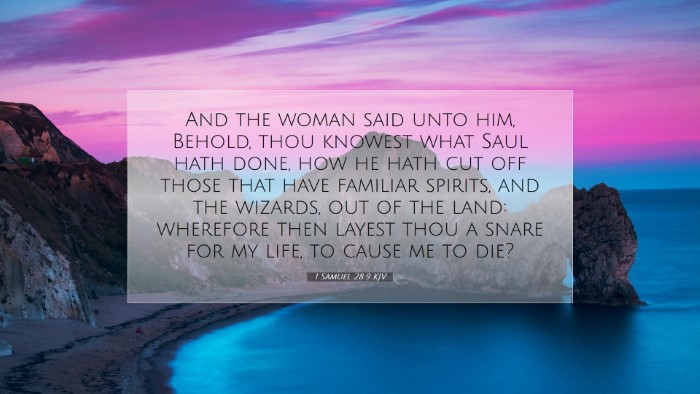Commentary on 1 Samuel 28:9
Verse: “And the woman said unto him, Behold, thou knowest what Saul hath done, how he hath cut off those that have familiar spirits, and the wizards, out of the land: wherefore then layest thou a snare for my life, to cause me to die?”
Contextual Background
1 Samuel 28 narrates a critical episode in the life of King Saul, occurring at a time when he has fallen away from God. Seeking counsel from a medium, he epitomizes a desperate act of a king devoid of divine guidance. This verse highlights a conversation between Saul and the medium at Endor, revealing Saul's complex political maneuvering and spiritual desperation.
Insights from Commentaries
Matthew Henry's Commentary
Matthew Henry provides an insightful analysis regarding the spiritual implications of Saul's actions. He suggests that Saul’s inquiry into the realm of the dead shows his abandonment of faith in God. The medium's response serves two purposes: it establishes her awareness of Saul's decree against mediums and underscores the irony of Saul, the very king who sought to eliminate such practices, now stands before one of the 'wizards' he sought to eradicate.
- The Dilemma of the Medium: Henry points out that the woman recognizes the danger posed to herself. The 'snare' metaphor he describes reflects not only her fear of royal reprisal but also a deeper moral quandary about engaging in necromancy.
- Saul’s Vulnerability: The commentary reflects on Saul's spiritual downfall and how it compels him to resort to means he once condemned. It reveals the tragic transformation of a once anointed king into one who seeks counsel from the dark arts.
Albert Barnes' Notes
Albert Barnes emphasizes the fear that gripped the medium, illustrating the tension that arises from illegal and forbidden practices. The medium's knowledge of Saul's decree not only contextualizes her caution but also the irony of her current situation.
- Recognition of Authority: Barnes notes how the medium acknowledges the actions of Saul against her profession, highlighting the king's previous efforts to purge the land of such individuals, reflecting his inner conflict.
- Theological Implications: Barnes cautions against seeking guidance from spirits and notes the futility of Saul's actions. He posits that divine silence is a form of judgment which Saul now experiences, further driving him to seek out forbidden paths.
Adam Clarke's Commentary
Adam Clarke brings attention to the dynamics of the dialogue, particularly focusing on the woman’s hesitance and her moral considerations when faced with Saul. Clarke elaborates on the medium's fears, which indicates an awareness of both societal laws and the moral laws in light of her supernatural encounter.
- Understanding of Supernatural Forces: Clarke asserts that the woman's awareness of "familiar spirits" indicates her belief in the dangers associated with her practices, casting a shadow on the legitimacy of Saul's request.
- The Question of Guilt: Clarke highlights her rhetorical question to Saul, questioning why he seeks to endanger her life when he has condemned such practices—revealing her intuitive understanding of the renewed danger she faces.
Theological Reflections
This interaction serves as a rich ground for theological reflection. It offers profound insights into the nature of disobedience, desperation, and the consequences of abandoning divine guidance. As King Saul seeks the voice of the dead amidst his failures, the text warns of the dangers associated with seeking supernatural assistance apart from God.
- Desperation and Seeking Guidance: The text illustrates human tendencies to seek guidance from forbidden places when divine wisdom seems absent—an important lesson for believers concerned with spiritual integrity.
- The Consequences of Isolation: The isolation experienced by Saul manifests in his recourse to a medium—illustrating the spiritual dangers of detaching oneself from God's presence.
Applications for Pastors and Theologians
For pastors and theologians, this verse invites considerations of the following:
- Warning Against Syncretism: The narrative warns against blending sacred practices with those deemed unacceptable, as seen in Saul's interactions.
- Exploring the Nature of Divine Silence: Discussion on the reasons for divine silence and the spiritual consequences that arise from prolonged disobedience could yield fruitful exploration for congregational teaching.
- Pastoral Care in Moments of Desperation: Pastors may use these insights to offer guidance to congregants who may find themselves seeking direction from unwholesome sources in times of crisis.
Conclusion
In summary, 1 Samuel 28:9 serves as a sobering passage that exposes the profound distress of a king estranged from God. Through the insights of respected biblical scholars, the verse remains a cautionary tale about the moral complexities of one who, in desperation, turns to a path he once denounced. The various commentaries converge on the themes of fear, irony, and spiritual resignation, presenting a multi-faceted view of the consequences of seeking knowledge apart from God.


